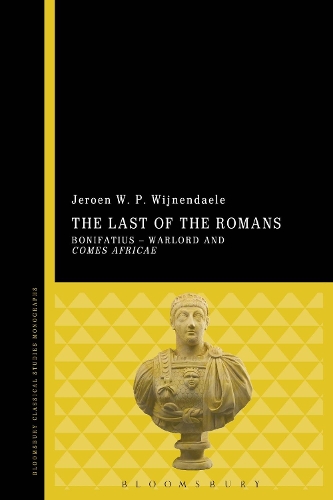
The Last of the Romans: Bonifatius - Warlord and comes Africae
(Hardback)
Available Formats
Publishing Details
The Last of the Romans: Bonifatius - Warlord and comes Africae
By (Author) Jeroen W. P. Wijnendaele
Bloomsbury Publishing PLC
Bloomsbury Academic
18th December 2014
United Kingdom
Classifications
Tertiary Education
Non Fiction
European history
Military history
937.09
Physical Properties
Hardback
200
Width 156mm, Height 234mm
458g
Description
Despite his critical role in the western Roman Empire during the early fifth century AD, Bonifatius remains a neglected figure in the history of the late Empire. The Last of the Romans presents a new political and military biography of Bonifatius, analysing his rise through the higher echelons of imperial power and examining themes such as the role of the buccellarii as contemporary semi-private armies. The volume offers a reassessment of the usurpation of Ioannes and Bonifatius indispensable role in the restoration of the Theodosian dynasty in the West. The Vandal invasion of North Africa is re-examined together with Bonifatius's putative role as the traitor who invited them in. The relationship between Bonifatius and Augustine of Hippo is assessed, bringing new light to the important, yet largely unstudied, influence of Christianity in Bonifatius's life. A further discussion revisits the rivalry between Boniface and Aetius. Although Procopius termed Bonifatius and Aetius the last of the Romans, this volume argues that they were the first of Rome's late imperial warlords. The volume closes with a reconstruction of the Odyssey of Sebastian, Bonifatius son-in-law.
Reviews
This body of work makes clear the complexity of Late Roman politics, as well as taking a different perspective on the role played by Roman emperors in politics in both parts of the Empire ... [It] contains a number of astute observations. * Bryn Mawr Classical Review *
Wijnendaele's study provides a welcome addition to the research on Western-Roman history. * GNOMON (Bloomsbury translation) *
This short book represents a thoughtful and successful attempt to sketch a biography of the late Roman warlord Count Bonifatius ( 432) ... This enjoyable study would be accessible to a general reader, and it is successful in explaining the complex period that it handles. * Latomus ASBL *
A thorough and balanced account ... Wijnendaele has shed new light on his subject from all angles and thus has not only delivered an interesting study of Bonifatius, but also formulated observations from a special perspective on the general situation of the Western Roman Empire of this era. ... In this respect, Wijnendaele's book is a stimulating new portrayal [and] an alternative look at the history of the Western Roman Empire between 413 and 433. -- Ulrich Lambrecht * H-Soz-Kult online *
[This] is a clearly written study that negotiates the difficulties of a complex period with assurance, is based on close familiarity with the ancient sources and with the most recent scholarship. * The Classical Review *
The fruit of a great deal of thorough research ... Wijnendaele offers a coherent and unified reconstruction ... It goes far beyond simple biography. ... An excellent volume. * Catargine (Bloomsbury translation) *
Wijnendaele provides a solid, source-rich, factual presentation of the life story of Boniface. (Bloomsbury translation) * Historische Zeitschrift *
[The books] greatest value lies in the fact that it brings Bonifatius to the fore, where he had not been for some time. * Classics Ireland *
The book is beautifully produced, with text, timeline, and some excellent notes. * Journal of Classics Teaching *
In the early fifth century the Roman West suffered chaos and disintegration, as the moribund House of Theodosius tried with diminishing success to remain in power. Count Boniface was a key figure in this effort. The author brings the count to life, displaying considerable acumen, infectious enthusiasm, and great sympathy for all players in the drama. This is an important book. -- Frank M. Clover, Professor Emeritus of History and Classics, University of Wisconsin, USA
Author Bio
Dr. Jeroen W. P. Wijnendaele is a lecturer at the Department of Classics at University College Cork, Ireland.
